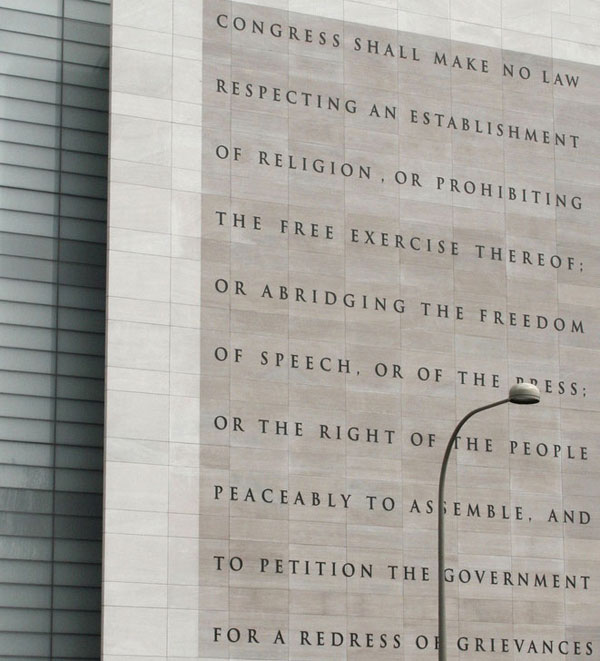
April 2, 2019; Atlanta Journal-Constitution
In the same way that regulators overseeing a nonprofit’s business should not have business relationships with that nonprofit, people who are subjects of scrutiny by the press should not be in charge of overseeing the press. It interferes with the integrity of reporting and limits the ability of journalists to tell stories about those in power.
Some members of Georgia’s state legislature, however, seem to disagree. Last week, Representatives Andrew Welch, Ron Stephens, Mark Newton, Timothy Barr, Rick Jasperse, and Mike Cheokas introduced HB 734, or the “Ethics in Journalism Act.” The act creates a state Journalism Ethics Board that would enact several controls upon the freedom of the press. In brief, it would:
- “Promulgate canons of ethics for journalism”—that is, set ethical practice
- Develop a voluntary accreditation process for journalists
- Handle Georgia residents’ complaints of ethics violations by journalists, including by sanctioning accredited journalists and organizations
According to the text of the bill, the commission would be housed at the University of Georgia’s Grady College of Journalism and comprise nine members, including journalists, editors, and journalism professors.
The bill would also provide that “Any individual who is interviewed by a member of the media shall have the right, upon request, to a copy of a full, unedited version of any audio or video recording of such interview as well as any photographs taken in connection with such interview,” and not only is the news organization or journalist that conducted the interview liable if they do not respond promptly, but each organization that runs the story containing that material is liable to a penalty of $100 a day.
In a purely practical sense, one can only imagine the nightmare this would be, but the principles at stake are much more concerning. Some commentators viewed this proposed bill as a deliberate effort by lawmakers to hamper journalists’ inconvenient investigations.
“It became clear it was an effort to rein in those who have been scrutinizing what’s been happening at the legislature,” wrote Richard T. Griffiths, a retired CNN vice president and former Grady College fellow who now heads the Georgia First Amendment Foundation. (One might note that under Georgia law, the state legislature is exempt from the Open Records Act—so journalists are under a heavier level of scrutiny than those upon whom they report.)
Sign up for our free newsletters
Subscribe to NPQ's newsletters to have our top stories delivered directly to your inbox.
By signing up, you agree to our privacy policy and terms of use, and to receive messages from NPQ and our partners.
Georgia University Professor Jonathan Peters has been featured in several news outlets commenting on the issue, but the full statement he posted on Twitter read: “This is a terrible idea.” He was more forthcoming in an email to Courthouse News, stating, “The bill strikes me as a publicity stunt with little chance of passing, but its provisions are nonetheless remarkable because of their offensiveness to basic First Amendment principles.”
Other professors expressed similar sentiments. “Can someone send them a copy of the damned First Amendment?” tweeted Jeff Jarvis, the director of the City University of New York’s Craig Newmark Graduate School of Journalism.
Welch, the bill’s sponsor, said that he had been wondering whether there were official ethical standards for journalism, and learned that “there is a Society of Professional Journalists [SPJ], but whether you’re a member or not…is completely voluntary.” He apparently wondered this after, according to the Atlanta Journal-Constitution, he recently “expressed frustration with what he saw as bias from a TV reporter who asked him questions about legislation.”
We return to the analogy we offered at the start of this article: If you put someone over the press, you make that person or body virtually immune from investigation, and therefore from public oversight. There exists an Ethical Journalism Network and other organizations like SPJ that offer guidance and principles for journalists, an international fact-checking network, and other voluntary organizations that encourage ethical behavior among journalists.
Yet trust in the media continues to decline, according to a Gallup poll released in October 2018. The US Press Freedom Tracker reports that already in 2019, 10 journalists have been attacked and five arrested. In addition, journalists have been threatened, boxed out from press conferences and events, and prevented from publishing.
Nora Benavidez, Director of U.S. Free Expression Programs at PEN America, wrote, “This proposal flies in the face of the most basic freedoms laid out in our Constitution, and pre-filing the bill right before the close of one legislative session and months ahead of the next is clearly intended to cast a threatening cloud over the press in Georgia.”—Erin Rubin












